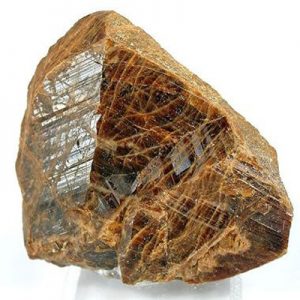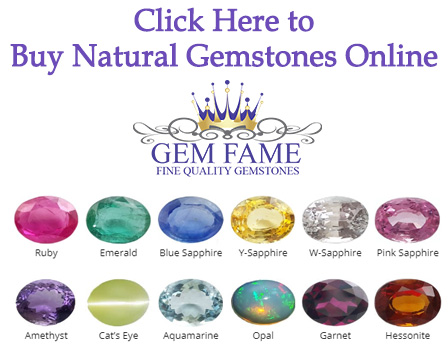Monazite
Monazite is a very rare gem that is slightly radioactive as defined in 49 CFR 173.403 (greater than 70 Bq/gram) due to the presence of Thorium (Th). The fact table material is very rare as most Monazite is a dull and opaque brown. Faceted gems are usually very small but an intense reddish brown.
Monazite is a primary ore of several rare earth elements (REE) such as Thorium, Cerium, and Lanthanum. Thorium is highly radioactive. Since Monazite is radioactive it is often metamict. Metamict is the condition when the radiation destroys the crystal lattice completely while leaving the outward appearance of the crystal unchanged. Increased metamictation will increase the transformation of the mineral’s fracture from irregular/uneven to conchoidal.Monazite is widely distributed but gem quality crystals are quite rare. The main sources of gems are Minas Gerais, Brazil, and Tsumeb, Namibia.
| Category: | Phosphate minerals |
| Formula: | (Ce, La)PO4 |
| Crystallography: | Monoclinic – Prismatic |
| Crystal Habit: | Crystals typically tabular on [100], may be prismatic, equant or wedge-shaped, to 27 cm; granular, massive. |
| Twinning: | Common, [100] as twin and composition plane, as contact twins. |
| Cleavage: | [100] Distinct, [010] Poor; parting on [001] or [111] |
| Fracture: | Conchoidal to Irregular/Uneven |
| Tenacity: | Brittle |
| Hardness (Mohs): | 5.0 – 5.5 |
| Density: | 4.98 – 5.43 (g/cm3) |
| Luminescence: | Dull brown cathodluminescence |
| Radioactivity: | If rich in Thorium: Weak; GRapi = 91,584.19 (Gamma Ray American Petroleum Institute Units) |
| Other: | Metamict if rich in Thorium. Paramagnetic |
| Color: | Reddish Brown, Brown, Pale Yellow, Pink, Grayish White |
| Transparency: | Translucent to Opaque |
| Luster: | Vitreous to Sub-Adamantine, Resinous, Waxy |
| Refractive Index: | 1.770 – 1.860 Biaxial (+) |
| Birefringence: | 0.053 – 0.067 |
| Dispersion: | r < v or r > v, weak, horizontal |
| Pleochroism: | Weak; Faint to imperceptible. In pale yellows. |


